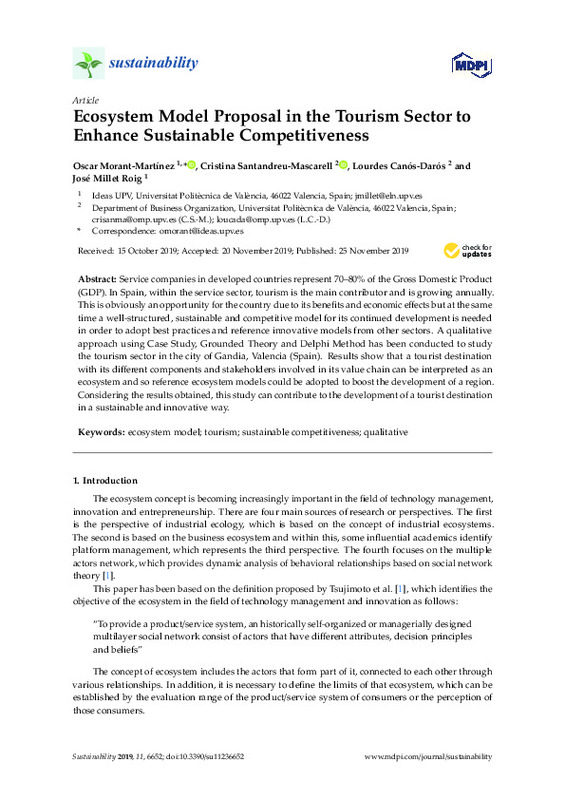Tsujimoto, M., Kajikawa, Y., Tomita, J., & Matsumoto, Y. (2018). A review of the ecosystem concept — Towards coherent ecosystem design. Technological Forecasting and Social Change, 136, 49-58. doi:10.1016/j.techfore.2017.06.032
Simatupang, T. M., Schwab, A., & Lantu, D. (2015). Introduction: Building Sustainable Entrepreneurship Ecosystems. SSRN Electronic Journal. doi:10.2139/ssrn.3161598
Stel, A. van, Carree, M., & Thurik, R. (2005). The Effect of Entrepreneurial Activity on National Economic Growth. Small Business Economics, 24(3), 311-321. doi:10.1007/s11187-005-1996-6
[+]
Tsujimoto, M., Kajikawa, Y., Tomita, J., & Matsumoto, Y. (2018). A review of the ecosystem concept — Towards coherent ecosystem design. Technological Forecasting and Social Change, 136, 49-58. doi:10.1016/j.techfore.2017.06.032
Simatupang, T. M., Schwab, A., & Lantu, D. (2015). Introduction: Building Sustainable Entrepreneurship Ecosystems. SSRN Electronic Journal. doi:10.2139/ssrn.3161598
Stel, A. van, Carree, M., & Thurik, R. (2005). The Effect of Entrepreneurial Activity on National Economic Growth. Small Business Economics, 24(3), 311-321. doi:10.1007/s11187-005-1996-6
About Daniel Isenberghttps://www.babson.edu/academics/executive-education/expanding-entrepreneurship/babson-entrepreneurship-ecosystem-platform/daniel-isenberg/
Brekke, T. (2015). Entrepreneurship and path dependency in regional development. Entrepreneurship & Regional Development, 27(3-4), 202-218. doi:10.1080/08985626.2015.1030457
Garud, R., Kumaraswamy, A., & Karnøe, P. (2009). Path Dependence or Path Creation? Journal of Management Studies, 47(4), 760-774. doi:10.1111/j.1467-6486.2009.00914.x
Mason, C. M., & Harrison, R. T. (2006). After the exit: Acquisitions, entrepreneurial recycling and regional economic development. Regional Studies, 40(1), 55-73. doi:10.1080/00343400500450059
Instituto Nacional de Estadísticahttps://www.ine.es
Gandia es el Undécimo Destino Con Mejor Ocupación Hotelera de Toda Españahttps://www.lasprovincias.es/safor/gandia-undecimo-destino-20191107011433-ntvo.html?fbclid=IwAR1vvgBcROmlD-hVkWnZ2D31LNpor8OX2XW7Rkeaznn0xccPsZXOfNTqSI0
Chetty, S. (1996). The Case Study Method for Research in Small-and Medium-Sized Firms. International Small Business Journal: Researching Entrepreneurship, 15(1), 73-85. doi:10.1177/0266242696151005
Partington, D. (2000). Building Grounded Theories of Management Action. British Journal of Management, 11(2), 91-102. doi:10.1111/1467-8551.00153
Sabater, J. J. G., & Garcia, J. A. M. (2011). Can we still talk about continuous improvement? Rethinking enablers and inhibitors for successful implementation. International Journal of Technology Management, 55(1/2), 28. doi:10.1504/ijtm.2011.041678
Santandreu-Mascarell, C., Canós-Darós, L., & Pons-Morera, C. (2011). Competencies and skills for future Industrial Engineers defined in Spanish degrees. Journal of Industrial Engineering and Management, 4(1). doi:10.3926/jiem.2011.v4n1.p13-30
Pace, S. (2004). A grounded theory of the flow experiences of Web users. International Journal of Human-Computer Studies, 60(3), 327-363. doi:10.1016/j.ijhcs.2003.08.005
Loo, R. (2002). The Delphi method: a powerful tool for strategic management. Policing: An International Journal of Police Strategies & Management, 25(4), 762-769. doi:10.1108/13639510210450677
Okoli, C., & Pawlowski, S. D. (2004). The Delphi method as a research tool: an example, design considerations and applications. Information & Management, 42(1), 15-29. doi:10.1016/j.im.2003.11.002
Grisham, T. (2009). The Delphi technique: a method for testing complex and multifaceted topics. International Journal of Managing Projects in Business, 2(1), 112-130. doi:10.1108/17538370910930545
Crouch, G. I., & Ritchie, J. R. B. (1999). Tourism, Competitiveness, and Societal Prosperity. Journal of Business Research, 44(3), 137-152. doi:10.1016/s0148-2963(97)00196-3
Invertir—Gandia Empresarialhttp://gandiaempresarial.com/invertir/
[-]









